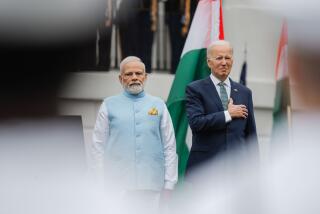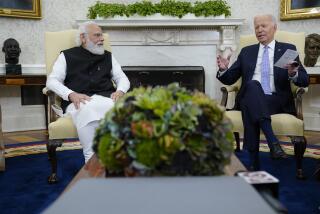Bhutto, in Harvard Speech, Calls for Democracies to Unite to Become ‘Moral Force’
CAMBRIDGE, Mass. — Declaring “Democratic nations, unite,” Pakistani Prime Minister Benazir Bhutto on Thursday called for the formation of an international association of democratic countries that would use observer teams, foreign aid and economic sanctions to protect democracies and punish dictatorships worldwide.
Bhutto, in a 30-minute commencement address delivered during a two-day visit to Harvard University, her alma mater, stressed that “democracy, particularly emerging democracy, can be fragile. And the best support for democracy comes from other democracies.”
Halfway through her first official visit to the United States since her November election victory, the 35-year-old prime minister drew several ovations from the thousands of new graduates, families and professors who braved the rain and chill of the outdoor ceremony.
A former political prisoner herself, Bhutto conceded that her proposed association would be a largely “moral force,” but she added: “I would urge that morality has a larger power in international relations than is commonly recognized.”
But when asked at a news conference afterward whether China, among Pakistan’s closest allies, should be sanctioned for last weekend’s widespread bloodshed in Beijing, she conceded: “You’re putting me further on the spot.”
She added, “Many countries who have friendships with China are very disturbed with what is going on there. . . . We are concerned about what is going on there, and we’d like to see a return to stability and restraint.”
Bhutto nonetheless received a hero’s welcome at Harvard, where she graduated from affiliated Radcliffe College 16 years ago. Last week she told The Times that the campus visit would be the personal highlight of her five-day state visit.
“She’s an inspiration to all of us,” one woman graduate said Thursday of Bhutto, who is casting herself as an international symbol of democracy and nonviolent struggle. “She’s a great role model, and everyone here is thrilled.”
Peter Galbraith, a senior adviser to the Senate Foreign Relations Committee, compared Bhutto’s announcement at Harvard of her proposed Assn. of Democratic Nations to former Secretary of State George C. Marshall’s unveiling here of his Marshall Plan, the U.S. economic program that helped Europe recover after World War II.
Galbraith, a former classmate of Bhutto and still an informal adviser to the prime minister, added that her visit contains many important messages for the world.
“For Harvard specifically, Benazir first came here at a time that was dominated by the growth of the women’s movement,” Galbraith said during the ceremony. “So what Benazir signifies is the success of that new generation. She comes back now symbolizing that success for the world.”
Speaking generally, he added, “What the whole visit does is project to the American people a very different image of Islam. For a decade, our image of the Islamic world has been shaped by (Iran’s Ayatollah Ruhollah) Khomeini, a vindictive and vengeful leader.
“Now Khomeini is dead, and you have here somebody who is young, attractive and a woman, who is the elected leader of the only real democracy in the Islamic world. And that’s an important image to project.”
Bhutto herself played on the symbol in her commencement speech.
“I have often heard the argument that a Muslim country, as such, cannot have a working democracy,” she declared. “But I stand before you, a Muslim woman, the elected prime minister of 100 million Muslims, and a living refutation of such arguments and notions.”
She quoted from the Pakistani poet Mohammed Iqbal as proof that Islam and democracy are as compatible as she and her new-found position of power: “As Iqbal said--and what is universally applicable--’Life is reduced to a rivulet under dictatorship. But, in freedom, it becomes a boundless ocean.’ ”
The commencement address was just one event in an intense day that demonstrated graphically what Bhutto had told The Times in an interview in Islamabad last week.
“I was longing to go back to Cambridge. What could be a more sentimental journey than going back to Harvard as prime minister?” she said. “Harvard Yard is like a home to me.
“When we were doing the program (for the visit), I said, ‘You’ve got to keep an hour or two for me to wander around Harvard Square,’ and they said, ‘How will you go?’ So I said, ‘I’ll catch a cab.’ And suddenly one of the aides smiled and said, ‘You won’t have to catch cabs anymore, Mrs. Prime Minister.’ ”
In fact, she didn’t, being chauffeured throughout Boston in a stretch Lincoln Continental limousine. But her schedule was so hectic that Bhutto found herself with no time to shop at Coops, her favorite bookstore, or have a peppermint ice cream--her favorite flavor--at Brigham’s Ice Cream Parlor.
So Sen. Edward M. Kennedy (D-Mass.), another old friend, made sure the ice cream was on the menu of the elegant dinner of salmon and veal that he hosted for her Thursday night at the ultra-modern John F. Kennedy Library and Memorial in Boston Harbor.
More to Read
Sign up for Essential California
The most important California stories and recommendations in your inbox every morning.
You may occasionally receive promotional content from the Los Angeles Times.










